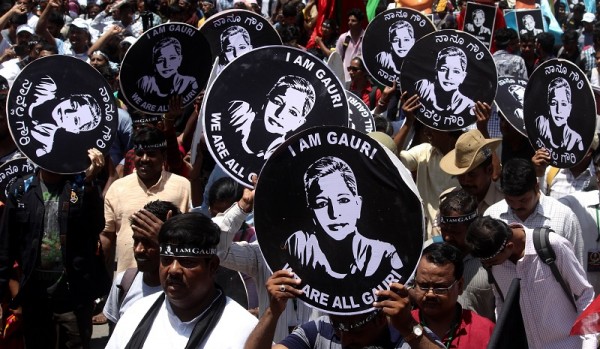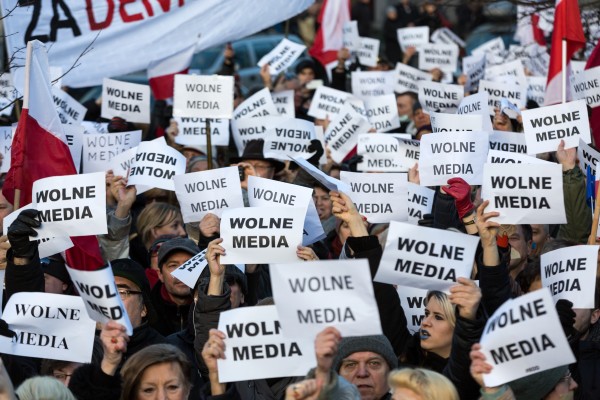This month’s killing of renowned journalist Gauri Lankesh, shot dead outside her home in Bangalore, has again put a spotlight on safety of journalists and the state of press freedom in India.
Lankesh, founding editor of the Kannada-language weekly tabloid Gauri Lankesh Patrike, was found dead on her porch with multiple bullet wounds to her chest and head on Sept. 5. Authorities have yet to publicly establish a motive.
The International Press Institute (IPI) joined press groups throughout India in condemning the killing and calling the authorities for a credible investigation into the case.
Lankesh was known as an active critic of Hindu nationalism, far-right politics and the caste system. Last year she was sentenced to six months in prison in two defamation cases brought by members of the Bharatiya Janata Party, India’s largest political party.
Her death brought tens of thousands of demonstrators, including activists and journalists, to streets across several Indian cities, including some 15,000 people in Bangalore on Tuesday.
Lankesh’s murder in a major metropolitan city follows a long string of journalists’ deaths in rural India. According to IPI’s Death Watch, Lankesh is the fourth journalist to die in the country within the last year under circumstances that suggest the death was linked to his or her work.
Overall, at least 63 journalists have lost their lives since 1997 and 35 of those deaths have come since the beginning of 2010. Most of those deaths were killings and most of those killings have been met with impunity.
IPI Executive Board Member Riyad Mathew, the editor of Indian newspaper Malayala Manorama and newsmagazine The Week, said that attacks and threats against critical journalists have become more common, and that state and local governments have mostly failed to protect the media.
He recently spoke with IPI Contributor Henri Koponen about the atmosphere in India in the wake of Lankesh’s killing.
IPI: Have other journalists killed in India been covering sensitive issues similar to those that Gauri Lankesh was writing on?
Mathew: The majority of the killings have been of journalists of small newspapers and local cable TV channels for exposing corruption and illegal loot of sand, timber, stone and other natural resources. In these cases, the police dismiss the killings as gang rivalries, accusing the journalist of either working for rivals or of blackmailing.
According to international and Indian organisations monitoring the state of press freedom, 13 to 17 journalists have been murdered during 2014 to 2017. The Hoot, a media monitor, had reported that the 16-month period of January 2016 to April 2017 had seen 54 major attacks on journalists leading to severe injuries.
In the last 12 months, Gauri Lankesh is the first journalist working from a big metropolitan area to be assassinated for strong political writings and public activism.
IPI: Is the atmosphere in India becoming more dangerous for critical journalists?
Mathew: Yes. Many outfits are using social media to troll political and cultural critics aggressively, relentlessly, ruthlessly and in a corporate style.
IPI: Do you have a general idea which groups launch these harassment campaigns?
Mathew: There is a strong impression right-wing political parties are encouraging trolls. Some trolls who post vicious and abusive tweets are “followed” by people in government. Public demands that they “unfollow” these trolls have not been heeded. The corporate working style of social media trolls has been discussed in detail in the book “I Am a Troll”, written by a journalist, Swati Chaturvedi. It was published by Juggernaut Books (New Delhi) last year.
The author has given examples of vicious trolling against notable journalists, especially television journalists, and has written about key men who run these trolling operations as if they were running a BPO [-ed. business process outsourcing operation]. She has interviewed them as well as people who walked out of this group in disgust and blew the whistle.
IPI: What are media outlets, for example Malayala Manorama and The Week, doing to support their journalists who receive threats/harassment?
Mathew: Malayala Manorama and The Week have not received any death threat in recent times. In the past, journalists in our group who faced death threats — from criminals or extremist groups — were wholeheartedly supported and ably protected by the editors and the management, by seeking intervention of the police and other government machinery.
IPI: How have journalists reacted to the killings and the threats against them?
Mathew: Journalists have come out in the streets in big cities and small towns to protest and condemn the targeted killing of journalists who ask questions to the power, or crusade against corruption and malfeasance. Newspapers and television channels have written or telecast strong messages that media cannot be whipped.
IPI: Is self-censorship increasing?
Mathew: There have been questions about whether there is self-censorship, but independent newspapers, news agencies, magazines and television channels in English and all Indian languages continue to publish and telecast content which is not to the liking of different sections. But the targeting of individual journalists brings in a menace which is being handled with courage, as was shown in the demonstrations in support of Gauri Lankesh.
IPI: Are the government and state governments doing anything to protect journalists?
Mathew: Not much. The national government is confronted with charges of intimidating the media and of being intolerant to criticism. In India, the policing is with state governments. In states where killings and attacks took place, [they] have done nothing concrete and in some cases have blamed the media for generating negativity, falsehood and being against positive deeds of the state governments. The police, with no independence and being at the mercy of the political establishment, become inert when such sensitive killings happen.
Though courts and the Press Council [of India] support press freedom, the legal process is too slow. These factors embolden the killers to plan and execute drive-by shootings which have felled more than a dozen journalists in three years.



